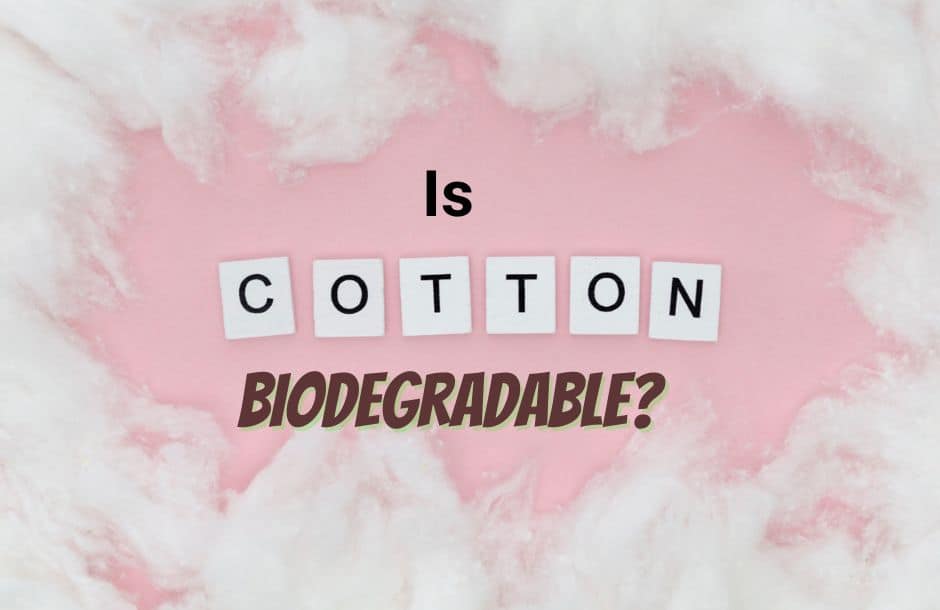Is cotton biodegradable?
Cotton is a natural fiber that is derived from the cotton plant. The cotton plant is a member of the mallow family, which is a group of plants that also includes hibiscus and okra. Cotton is a soft, fluffy material that is often used to make clothing, towels, and other textile products.
Cotton is biodegradable, meaning that it can be broken down by bacteria and other organisms. However, the precise time it takes for cotton to decompose will vary depending on the conditions in which it is placed. For example, if cotton is placed in a landfill, it may take several decades to decompose. However, if cotton is placed in a compost heap, it will decompose much more quickly.
If you’re looking for an environmentally friendly material, cotton is a great option. Cotton is biodegradable, so it won’t harm the environment when it’s eventually discarded.
In fact, cotton is one of the most sustainable materials available, due to its low environmental impact and ability to be recycled.
In addition, cotton is a renewable resource, so it can be grown again and again.
So if you’re looking for an earth-friendly option, cotton is a great choice!
Introduction to Biodegradable Cotton
Cotton is a natural fiber that can be used to make a number of different products, including clothing, towels, and bedding. It is also one of the most popular materials used in the production of paper. Cotton is a soft, fluffy material that is derived from the seeds of the cotton plant. The plant is native to tropical and subtropical regions around the world, and has been cultivated for thousands of years.
Cotton is a renewable resource that can be grown on an annual basis, making it a sustainable choice for a number of different applications. It is also biodegradable, meaning that it will break down naturally over time. Cotton can be composted or recycled, making it a versatile and eco-friendly material.
What is cotton?
Cotton is a soft, fluffy staple fiber that grows in a boll, or protective case, around the seeds of the cotton plants of the genus Gossypium in the mallow family Malvaceae. The fiber is almost pure cellulose. Under natural conditions, the cotton bolls will tend to increase the dispersal of the seeds.
The plant is a shrub native to tropical and subtropical regions around the world, including the Americas, Africa, and India. The greatest diversity of wild cotton species is found in Mexico, followed by Australia and Africa. Cotton was independently domesticated in the Old and New Worlds.
Cotton plays a critical role in the economy of developing countries, where it is the most important source of export earnings after oil. In developed countries, cotton is mainly used in the manufacture of clothing.
Cotton is biodegradable and will decompose back into the soil, providing nutrients for plants.
The biodegradability of cotton
Cotton is a natural fiber that can be easily degraded by microorganisms. In fact, cotton is one of the most biodegradable fabrics available. However, the rate at which cotton decomposes will depend on a number of factors, including the type of cotton and the conditions in which it is buried. Generally speaking, cotton will take between two and five years to fully decompose.
The decomposition of cotton
Cotton is a soft, fluffy staple fiber that grows in a boll, or protective case, around the seeds of the cotton plants of the genus Gossypium in the mallow family Malvaceae. The fiber is almost pure cellulose. Under natural conditions, the cotton bolls will open and release the seeds. The cottonseed will then sprout and produce new cotton plants.
Cotton is biodegradable and will decompose over time. However, the decomposition process can be accelerated by shredding the cotton into smaller pieces. The smaller the pieces, the more surface area is exposed to microorganisms, which speeds up the decomposition process.
The environmental impact of cotton
Cotton is a natural fiber that is grown around the world. It is used to make a variety of products, including clothing, linens, and other textiles. Cotton is also used as a stuffing material for pillows, stuffed animals, and other items.
While cotton is a renewable resource, its production does have an environmental impact. Cotton cultivation requires the use of pesticides and other chemicals. These chemicals can pollute the air, water, and soil. They can also be harmful to the farmers who work with them.
Cotton production also requires a lot of water. In fact, it takes about 2,700 liters (700 gallons) of water to produce just one kilogram (2.2 pounds) of cotton. This water is used to irrigate the fields and to clean the cotton after it is harvested.
The environmental impact of cotton production can be reduced in several ways. One is to use more efficient irrigation methods, such as drip irrigation. This can help to reduce the amount of water needed for cultivation.
Another way to reduce the impact of cotton production is to use more environmentally friendly pesticides and other chemicals. This can help to reduce pollution and to protect the farmers who work with the cotton.
Finally, it is important to support companies that are working to reduce the environmental impact of their cotton production. These companies are working to develop more sustainable methods of cultivation and to use more environmentally friendly materials in their products.
Cotton Recycling
As the world increasingly becomes more environmentally conscious, the need for sustainable, eco-friendly materials becomes more and more important. Cotton is one such material, and fortunately, there are now many ways to recycle cotton materials and keep them out of the landfill.
One of the most popular methods of recycling cotton is to use it as insulation. Cotton insulation is a great alternative to traditional insulation, such as fiberglass, because it is natural, sustainable, and non-toxic. It is also a great way to keep your home cool in the summer and warm in the winter.
Another popular way to recycle cotton is to use it as composting material. Cotton is a great composting agent because it is a natural material and it helps to break down other organic materials. Cotton composting is a great way to improve the quality of your garden soil and to reduce your environmental impact.
There are also many ways to recycle cotton clothing. You can donate your old cotton clothes to a charity or thrift store, or you can recycle them into rags or insulation. You can also compost old cotton clothes if they are made from organic cotton.
Cotton recycling is a great way to reduce your environmental impact and to help conserve resources. By using recycled cotton, you can help reduce the amount of cotton that is sent to the landfill each year. So the next time you have some old cotton clothes or insulation, don’t throw it away – recycle it!
key takeaways
Yes, cotton is biodegradable. This means that it will eventually break down and return to the earth. The time it takes for cotton to biodegrade will depend on the conditions it is in. For example, if it is buried in the ground, it will take longer to biodegrade than if it is left out in the sun.

